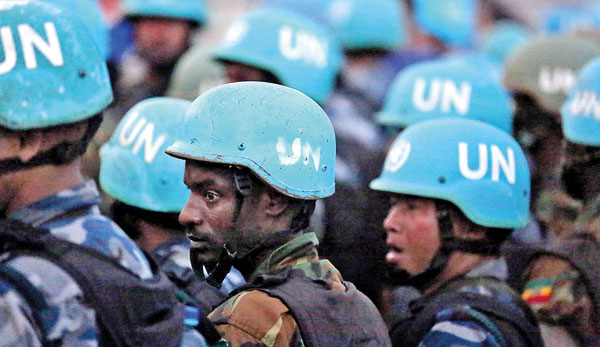Sunday Times 2
UN continues multimillion-dollar purchases from a blacklisted Russia
UNITED NATIONS (IPS) – The world’s financial institutions, primarily in the US and Europe, have cut off links and economically ostracised Russia for its invasion of Ukraine and violation of the UN charter.
UN Secretary-General Antonio Guterres lambasted the Russians declaring the military invasion “a violation of the territorial integrity and sovereignty of Ukraine — and inconsistent with the principles of the Charter of the United Nations.”
The White House announced last week that the United States and allies will kick certain Russian banks out of a major international banking system, a significant step in a bid to cripple the Russian economy.

Russia is one of the top suppliers of equipment to UN peacekeeping forces
Meanwhile, the International Criminal Court in The Hague has already announced plans to launch a war crime investigation into Russia’s invasion of Ukraine.
But despite the fact that Russia has been politically and economically isolated as an international pariah, the UN Secretariat is continuing its relationship with Russian companies — buying goods and services, primarily relating to air transportation, information and communication technologies (ICT) and food catering, mostly for the UN’s 12 peacekeeping missions.
The approved budget for UN Peacekeeping operations for the fiscal year July 1, 2021- June 30, 2022 is a staggering $6.38 billion — and payments to Russian contractors will flow largely from this budget.
An equally valid question is: How will the UN pay for these purchases and services when Russians have been barred from most of the international banking system.
Last week, the US, Canada and Europe tightened financial restrictions on Russia with a new ban that blocks seven Russian banks from using SWIFT, the global messaging system that enables bank transactions. The move was aimed at disrupting Russia’s ability to do business across borders.
According to the latest available figures, the UN’s purchases from Russia amounted to about $132.3 million in 2020, with Moscow listed as the 5th largest supplier behind the UAE, the USA, Kenya and Switzerland.
The UN also has trade links with Russia’s largest helicopter operator, UTair — Helicopter Services, described as a leading provider of aviation services to companies in the fuel and energy industries, plus the United Nations.
There have also been rumors that some of the contracting firms have links to Russian oligarchs and high-ranking political officials who have been crippled by US and Western European sanctions.
But apparently not at the United Nations. An Asian diplomat characterized it as UN’s “sheer political hypocrisy”.
On February 25, US Secretary of State Antony Blinken said the US was inflicting unprecedented costs on President Putin and those around him for their brutal and unprovoked assault on the people of Ukraine.
“We are united with our allies and partners in our commitment to ensure that the Russian government pays a severe economic and diplomatic price for its further invasion of Ukraine, a sovereign and democratic state,” he added.
Meanwhile, the head of the UN’s Department of Operational Support did not respond to two messages — seeking comments on the continued UN trade and economic relationship with Russia.
But Farhan Haque, the UN’s deputy spokesperson, was more forthcoming, when he told IPS: “What we can say is that if specific UN sanctions were imposed on the Russian Federation, or sanctions against a particular company or their principals that would affect their ability to perform, then, of course, we would comply.”
The UN does, however, lay down strict rules and guidelines for ethical behaviour of suppliers and contractors. But the violation of a country’s sovereignty and the invasion of a member state are not part of those rules.
According to UN guidelines, suppliers and contractors must comply with the United Nations Supplier Code of Conduct and General Conditions of Contract, in particular, the provisions on sexual exploitation, child labour, discrimination, conditions of work and harassment.
The UN Procurement Division also reminds the UN supplier community, that as a UN registered supplier “you have accepted the United Nations Supplier Code of Conduct, which reflects the core values outlined in the Charter of the United Nations” But a blatant violation of that same charter is apparently not a reason for expulsion.
Meanwhile, the UN has warned that while the scale and scope of displacement in Ukraine is not yet clear, it is expecting more than 10 million people to flee their homes if violence continues, including 4 million people who may cross borders to neighbouring countries triggering a major humanitarian crisis in Europe.
A breakdown of UN
suppliers follows:
Country/Territory Total
United Arab Emirates $460,265,239
United States of America $404,483,142
Kenya $227,831,838 Switzerland $152,339,756
Russian Federation $132,315,245
United Kingdom $95,685,434
Ukraine $83,448,131

